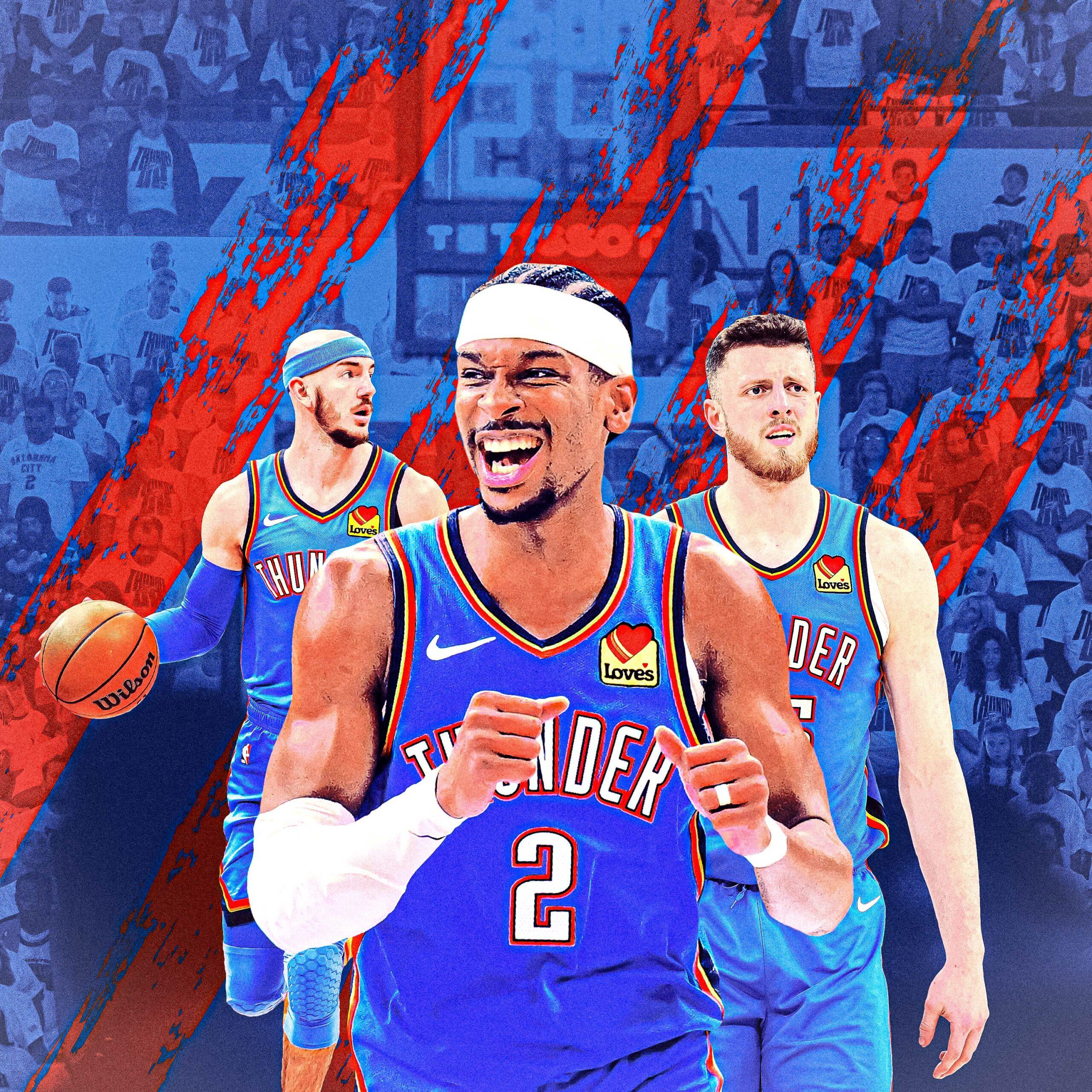
Say what you want about opponents’ injuries and illnesses or their own self-inflicted mistakes, but the Oklahoma City Thunder have finally broken through to the Western Conference finals, their first appearance since 2016 and, great expectations aside, an accomplishment that isn’t short on significance. How they did it says a lot about who they are, how they were built, and their ability to win the whole thing.
The Thunder’s seven-game slugfest against the Denver Nuggets, which ended with a blowout win on Sunday, was an ugly, off-kilter, soul-searching series for a team that entered it heavily favored to advance. They exited it learning just how adaptable and mentally tough they can be in spots when their own tried-and-true brand of basketball isn’t enough. They were down twice in the series, overcame a colossal 44-point effort by Nikola Jokic in Game 5, and then bounced back from a gut-wrenching Game 6 loss to win going away in Game 7.
Shai Gilgeous-Alexander dealt with constant double-teams and a stingy zone defense that was designed to squeeze the ball out of his hands. Jalen Williams bounced back from a couple inefficient stinkers and didn’t let any of them affect his defense. The Thunder’s collective effort, mainly from Alex Caruso and Isaiah Hartenstein, to confuse Jokic—and withstand his genius—was relentless and like nothing the three-time MVP had ever seen.
Lu Dort, Aaron Wiggins, Cason Wallace, Jaylin Williams, and Caruso all punctured Denver from deep with timely, open 3s that shifted momentum and turned games. Together, it was a show of resilience from a young team that, despite its wire-to-wire dominance throughout the regular season, had yet to prove it could persevere under the brightest possible lights against a proud, experienced group that had been there and done that. They’ll enter the West finals favored again, and while they may not beat the Minnesota Timberwolves—dear lord, what an incredible matchup—they will compete with a perspective that wasn’t possible two weeks ago.
All that said, it’s nearly impossible to win a playoff series while living outside your skin the entire time. The Thunder also beat the Nuggets by being themselves: a havoc-inducing swarm of arms and bodies that packs the paint, flies out to contest outside shots, and consistently capitalizes off the second-guesses that ball handlers are forced to make. Aside from employing the world’s best scorer, OKC’s primary strength is its ability to dominate the possession game. In the second round, the Thunder attempted 24 more shots than the Nuggets and scored 86 more points off turnovers. That is the battleground they’re comfortable scrapping on, and how they’ve pulverized everything in their path all season long.
It’s a run that didn’t take anyone by surprise, but that doesn't make it any less admirable. OKC’s journey is a linear stratagem that results directly from its own past failure. This year’s team was built to address last year’s shortcomings, as an imperfect no. 1 seed that didn’t have enough size (no rebounds, no rings), experience, or outside shooting to defeat the Dallas Mavericks. That season ended after the roster’s architect, Sam Presti, all but forewarned the possibility of getting let down during a press conference in September, where he delivered a quote that instantly became the stuff of lore. "I'm not trying to dismiss everyone's excitement, but we're not a .500 team. We have to finish our breakfast before we start acting like we're on the cusp of something."
That cautious plea—We have to finish our breakfast—to everyone who (correctly) foresaw a budding juggernaut might as well be stamped on T-shirts if the Thunder do in fact win it all next month. He was right. Success in the NBA is not possible without growth, and growth is not possible without honest self-evaluation. Disappointment tends to shine a light on one’s own frailty. Not everyone is brave or clever enough to look at it and spark change, though. Presti clearly was.
He was named the NBA’s Executive of the Year in 2025 for a reason. Well, actually two. The first was a stroke of genius, getting Caruso from the Chicago Bulls for Josh Giddey without attaching any draft compensation to the package. It was a heist that accentuated the fourth-best defense in the league by turning established strengths into unfair advantages, particularly useful when discombobulating Denver’s Jokic-driven machinery. And on the other end, the Thunder would not be in the conference finals without Caruso’s guile and shot-making. He drilled 42.9 percent of his 3s and finished plus-62, the third-best mark out of all players who saw action in the conference semifinals.
Caruso set the high ball screens for Gilgeous-Alexander that broke Denver’s zone and made countless energy plays to extend possessions. He also showed off his savvy and intuition over and over again. Here’s one example, where he directs SGA to hit Chet Holmgren on a flash into the paint and then cuts backdoor on Aaron Gordon for the reverse layup:
His battles against Jokic—whether fronting him in the post to deny an entry pass or clogging the lane as help off Russell Westbrook—help explain why Caruso finished this season ranked first in defensive estimated plus-minus.
Then there’s Hartenstein, a critical free agent signing who was worth every penny of his three-year, $87 million contract in this matchup. The Thunder do not beat the Nuggets with Holmgren starting every game at center. Presti knew this, and recognized all the ways Hartenstein would be invaluable if/when OKC saw Denver in the postseason.
Hartenstein exhausted Jokic with his 7-foot, 250-pound frame, battling for boards on both ends, slipping in that signature floater, and allowing OKC to be less desperate with its shifts and double-teams. He stood firm against enough post-ups and did a terrific job staying glued to Jokic during various two-man actions with Jamal Murray, extinguishing those patented short roll looks that have killed the league for years.
Most people who follow the NBA knew how dangerous Oklahoma City could be when Presti acquired two solid veterans who couldn’t address last season’s weaknesses any better if they were molded in a lab. But constructing a contender on a cap sheet and then actually seeing it perform in the hothouse of a grueling playoff series are two very different things. The Thunder aren’t champs yet, but after defeating the Nuggets in a way that forced themselves to be comfortable in several very uncomfortable situations, they’re finally closer than they’ve ever been.



